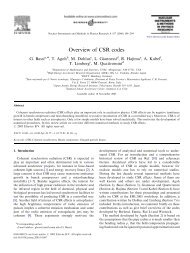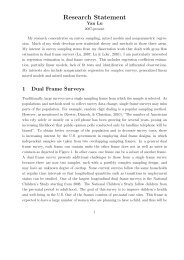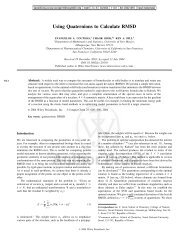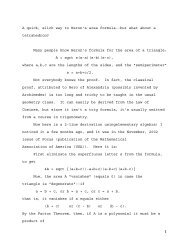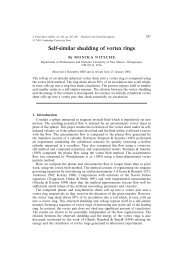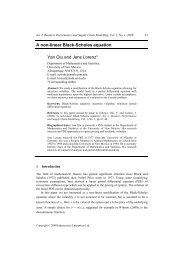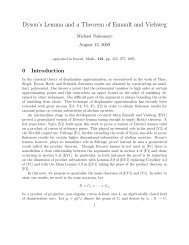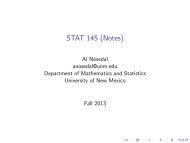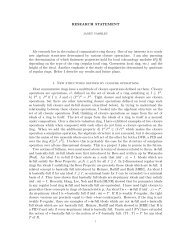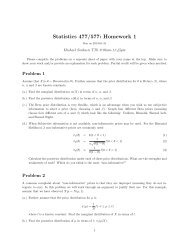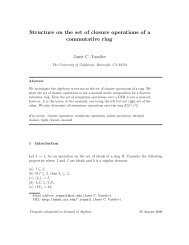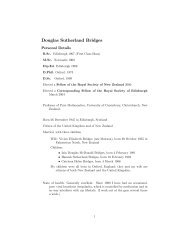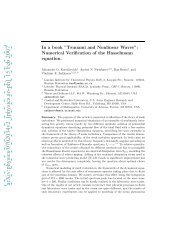OEO Office of Equal Opportunity - Department of Mathematics and ...
OEO Office of Equal Opportunity - Department of Mathematics and ...
OEO Office of Equal Opportunity - Department of Mathematics and ...
You also want an ePaper? Increase the reach of your titles
YUMPU automatically turns print PDFs into web optimized ePapers that Google loves.
RELIGIOUS STUDIES 281<br />
Introduction<br />
The Religious Studies Program is an interdisciplinary unit<br />
within the College <strong>of</strong> Arts & Sciences, with participation<br />
from faculty <strong>and</strong> students from across the entire University,<br />
including the various colleges, pr<strong>of</strong>essional schools, branch<br />
campuses, <strong>and</strong> the evening/weekend program. Our undergraduate<br />
program provides both an introduction to the scholarly<br />
study <strong>of</strong> religion <strong>and</strong> broad training in the liberal arts. We<br />
study religion in its own right <strong>and</strong> as a lens through which to<br />
view the human condition, contemporary human societies,<br />
intellectual <strong>and</strong> social history, spirituality, <strong>and</strong> ethics. Students<br />
major or minor in religious studies in order to pursue careers<br />
as educators or scholars <strong>of</strong> religion, to work toward becoming<br />
clerical or lay ministers in a variety <strong>of</strong> traditions, to prepare for<br />
pr<strong>of</strong>essional school, to pursue graduate education in allied<br />
humanities or social science disciplines <strong>and</strong>/or to explore<br />
their own deepest interests.<br />
Major Study Requirements<br />
The major requires 33 hours in Religious Studies, <strong>of</strong> which<br />
at least 18 must be at the upper division level. Required are<br />
230, 232, 263, 264; <strong>and</strong> 447 or another seminar at the 400<br />
level. In addition to the four lower division required courses,<br />
the student must also take at least one other course in each<br />
<strong>of</strong> the four distributional areas: Asian Religions, Western<br />
Religions, Sacred Texts <strong>and</strong> Religion in America.<br />
In order to provide flexibility <strong>of</strong> scheduling, the “Asian<br />
religions” distributional requirements (263 <strong>and</strong> another Asian<br />
religions course) <strong>and</strong> the “Western religions” distributional<br />
requirements (264 <strong>and</strong> another Western religions course)<br />
may also be met by appropriate pairs <strong>of</strong> general courses<br />
that together cover Asian <strong>and</strong> Western religions respectively.<br />
Thus, for example, the “Asian religions” requirements may<br />
also be met by taking two courses, one in Hinduism <strong>and</strong><br />
one in Buddhism; <strong>and</strong> the “Western religions” requirements<br />
may also be met by taking two courses, each covering one<br />
<strong>of</strong> the three major Western traditions, Judaism, Christianity<br />
or Islam.<br />
Hebrew, Arabic <strong>and</strong> Sanskrit, when these courses include a<br />
study <strong>of</strong> religious texts <strong>and</strong> are integrated with a program <strong>of</strong><br />
advanced studies <strong>of</strong> sacred texts.<br />
Religious Studies undergraduate courses count with Group<br />
II (Humanities) in the Arts <strong>and</strong> Sciences group requirements.<br />
Concentrations in Religious Studies are also <strong>of</strong>fered through<br />
the engineering <strong>and</strong> management colleges.<br />
Honors in Religious Studies<br />
Students wishing to work for Honors in Religious Studies<br />
should contact the Director <strong>of</strong> the Religious Studies Program<br />
during their junior year. Honors students sign up for two consecutive<br />
semesters <strong>of</strong> RELG 497, in which they prepare an<br />
Honors thesis under the direction <strong>of</strong> a committee.<br />
Graduate Program<br />
A master’s degree program in Religious Studies remains in<br />
the planning stages, but no timetable for implementation has<br />
been set. Contact the Religious Studies Program for more<br />
information.<br />
Religious Studies (RELG)<br />
101. Introduction to Religious Studies. (3)<br />
Comparative study <strong>of</strong> religious beliefs, practices <strong>and</strong> institutions.<br />
103. Introduction to Bible. (3)<br />
Survey <strong>of</strong> Bible in historical context.<br />
104. New Testament Greek. (1-6 to a maximum <strong>of</strong> 6) ∆<br />
(Also <strong>of</strong>fered as GREK 104.) Introduction to New Testament<br />
Greek.<br />
105. Religion <strong>and</strong> the Arts. (3)<br />
Introduction to the relationship between religion <strong>and</strong> culture<br />
as reflected in the arts.<br />
ARTS AND<br />
SCIENCES<br />
Classes in Religious Studies are divided among the four<br />
distributional areas (classes <strong>of</strong>fered under topics course numbers<br />
247, 347 <strong>and</strong> 447 are assigned to one <strong>of</strong> these areas as<br />
appropriate). The courses for each area are:<br />
1. Asian Religions: 107, 407, 408, 263, 331, 438, 439,<br />
440, 442, 448, 449, 453, 457, 481.<br />
2. Western Religions: 105, 264, 306, 323, 324, 326, 327,<br />
350, 360, 361, 365, 404, 413, 426, 450, 452, 465, 475.<br />
3. Sacred Texts: 103, 104, 109, 230, 231, 232, 463; 407,<br />
408, 440, or 449 may be used if not applied to Asian<br />
religions requirement.<br />
4. Religion in America: 303, 308, 333, 387, 388, 389,<br />
390, 392, 422, 430, 441, 482, 483, 490, 491; Law 665.<br />
Dual Major Requirements<br />
Students may combine a major in Religious Studies with<br />
another major. For students with such dual majors, the total<br />
number <strong>of</strong> hours required for the Religious Studies major is<br />
reduced from 33 to 30, while the other requirements for the<br />
major remain the same.<br />
Minor Study Requirements<br />
The minor requires 18 hours in Religious Studies, <strong>of</strong> which at<br />
least 9 must be in courses with a RELG prefix.<br />
Additional Information<br />
With the permission <strong>of</strong> the Director <strong>of</strong> the Religious Studies<br />
Program, a student may include among courses for a major<br />
or minor a limited number <strong>of</strong> courses in such languages as<br />
Classical Chinese, Classical or Biblical Greek, Latin, Biblical<br />
107. Living World Religions. (3)<br />
Introduction to major living world religions, such as Buddhism,<br />
Christianity, Hinduism, Islam <strong>and</strong> Judaism.<br />
109. Biblical Hebrew I. (4)<br />
(Also <strong>of</strong>fered as MLNG 109.) Introduction to the language <strong>of</strong><br />
the Hebrew Bible.<br />
230. Hebrew Scriptures. (3)<br />
Pentateuch <strong>and</strong> the historical books <strong>of</strong> the Old Testament.<br />
{Fall}<br />
231. Hebrew Prophets. (3)<br />
Prophetic books <strong>and</strong> later Hebrew scriptural writings.<br />
232. Christian Scriptures. (3)<br />
New Testament <strong>and</strong> early Christian history.<br />
247. Studies in Religions. (3) ∆<br />
Elementary topics in the study <strong>of</strong> world religions. Course may<br />
be repeated up to three times provided the topics vary.<br />
263. Eastern Religions. (3)<br />
A study <strong>of</strong> major Asian traditions, such as Taoism, Hinduism<br />
<strong>and</strong> Buddhism. {Fall}<br />
264. Western Religions. (3)<br />
A study <strong>of</strong> major Western traditions, such as Christianity,<br />
Islam <strong>and</strong> Judaism. {Spring}<br />
303. Introduction to Black Liberation <strong>and</strong> Religion. (3)<br />
(Also <strong>of</strong>fered as AFAM 303.) Students will be introduced to<br />
the Black experience, which necessitates the redefinition<br />
<strong>of</strong> God <strong>and</strong> Jesus Christ in the lives <strong>of</strong> Black people as the<br />
struggle for transcendental <strong>and</strong> political freedom.<br />
UNM CATALOG 2006–2007 Symbols, page 611.



